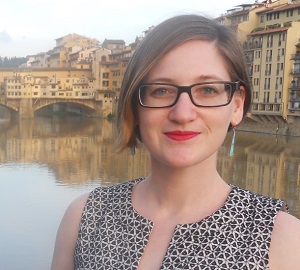Paula Derdiger Passes on Her Love for the Humanities at UMN-Duluth

Cultural pursuits are often where people find solace outside of the hectic day-to-day of the working world. For University of Minnesota-Duluth assistant professor Paula Derdiger, the humanities are simply part of the job description. As an academic in the University’s College of Liberal Arts, Derdiger finds great joy in writing about and teaching literature for a living. Her path in academia began by earning her Master of Arts in English Literature (MALit) at Northwestern School of Professional Studies.
“I feel immensely lucky to be in this profession,” Derdiger said. “I’m glad to be sticking up for the value of literature and the humanities.”
She’s worked hard to get there. Graduating from SPS in 2008, Derdiger went on to earn her PhD at McGill University in Montreal and taught at several institutions before landing a tenure track position at UMN-Duluth.
While enrolled in SPS, Derdiger continued working full time, but found that her studies filled her with energy. “I remember spending all of my lunch breaks doing work.” she recalled. “The job I was doing at the time was fine, but I didn’t find it all that challenging or fulfilling. I always looked forward to going to class and spending time doing the reading and the work. It was a total privilege.”
She also sought out the faculty she wanted to work with, who in turn supported her professional growth.
“I got to know Phyllis Lassner in my first year and ended up doing an independent study with her. Soon she became one of my most important mentors,” said Derdiger. “She helped me publish an essay based on our research and encouraged me to pursue my PhD. I continue to work with her on various projects today.”
Derdiger and Lassner in particular shared an interest in the writings of Elizabeth Bowen, but have teamed up on several publications. Most recently, Derdiger will have her first monograph, “Reconstruction Fiction: Literature and Housing in Postwar Britain,” included in a series edited by Lassner that is forthcoming from Northwestern University Press.
Derdiger also notes that Elizabeth Bowen is still a pivotal literary figure in her personal and professional work. Her research in general covers the gamut of modern and contemporary British literature, but is anchored in a passion for twentieth century work based in London.
As for the community she found in her classes, Derdiger still keeps in contact with several of her former classmates, who have used their degrees in a variety of fields since graduation. For Derdiger, the academic route has been quite rewarding, and she is excited to continue her work as an educator and scholar.
